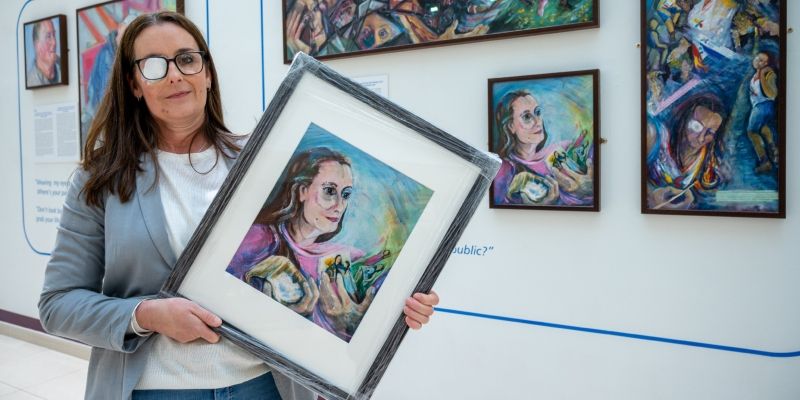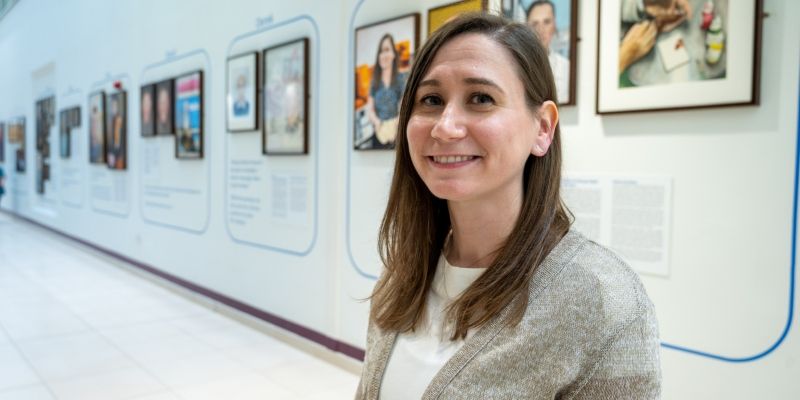Trial participants with facial prostheses have portraits painted

Patients who wear facial prostheses after treatment for head and neck cancer have had their portraits painted to illustrate the physical and psychological impact of living with a facial difference.
Fifteen patients who wear facial prostheses – bespoke removable silicone devices that replace a facial part such as an eye or nose – took part in the University of Leeds IMPRESSeD study, comparing modern and conventional methods of producing the prostheses in an early look at which technique was preferred by patients and potentially more cost-effective.
The study was funded by the National Institute for Health and Care Research (NIHR) and Leeds Hospitals Charity.
The portraits were painted as part of a public engagement project, named “I’m Still Me”, which was inspired by the research and co-created by the patients, researchers, healthcare professionals, artists, and public engagement practitioners.
They will be exhibited in the Atrium of the Bexley Wing at St James Hospital, Leeds, from 6 November 2024 to 31 January 2025.
The public engagement project was funded by Research England’s Enhancing Research Culture funding stream with additional support provided by a University of Leeds Engagement Fellowship.
Head and neck cancer can have a major impact on a patient’s health and wellbeing and receiving a prosthesis can be an important part of the process of coming to terms with the experience.
The IMPRESSeD study was led by Dr Rachael Jablonski, current NIHR Academic Clinical Lecturer and Specialty Registrar in Restorative Dentistry at the Leeds School of Dentistry and Leeds Dental Institute, as part of her PhD.
She said: “Head and neck cancer can have a major impact on a patient’s health and wellbeing and receiving a prosthesis can be an important part of the process of coming to terms with the experience.
“I worked with patient and public involvement (PPI) contributors to identify areas for improvement in the processes of making prostheses.
“Fifteen patients took part in the feasibility trial and were invited to take part in an interview after they had gone through both conventional and new methods. Almost all the patients who took part in the interviews preferred the newer processes of making facial prostheses in our initial study.
The next step would be a future full-scale trial.”
Making a prosthesis
The conventional prosthesis manufacturing process involves multiple clinical and laboratory procedures over several hospital visits with highly trained Maxillofacial Prosthetists, who recreate the facial part.
Firstly, an impression of the patient’s face is taken using a silicone or alginate material, which can be claustrophobic or uncomfortable and may distort the facial tissues, affecting the final product.
Maxillofacial Prosthetists use the impression to pour a plaster model, hand-sculpt a wax pattern, then convert it into a silicone prosthesis.
Replacements are needed every two years, but sometimes as often as soon as six months, due to changes in the patient’s face during the healing process; prosthesis wear and tear, and general degradation. Estimates suggest that the process can take up to 10 hours to complete and cost up to £1,500.
New facial prosthesis manufacturing techniques employ 3D facial scanning as a less invasive way of capturing the shape and texture of a patient’s face, as well as computer-aided design using artificial intelligence to reconstruct the facial feature, and 3D printing the design to help produce the facial prosthesis.
Digital technologies have the potential to support or replace steps in the manufacturing processes potentially helping to address pressures on the small numbers of qualified Maxillofacial Prosthetists working in the NHS.
Dr Jablonski worked with patients to identify priority areas for improvement in the manufacturing process, which were getting rid of uncomfortable facial impressions; more closely matching the way their face looked before surgery, and receiving their prosthesis sooner after surgery.
Patients from Leeds Teaching Hospitals NHS Trust and Guy’s and St Thomas’ NHS Foundation Trust in London received facial prostheses made using conventional and digital manufacturing approaches and were asked to assess both methods towards the end of the study.

Dr Jablonski said: “We found that 90% of patients we interviewed preferred digital over conventional processes due to the comfort, speed, hygiene, and perceived positive impact on outcomes associated with digital technology.
“Some patients felt contactless scanning may offer benefits when a patient’s skin is sore after surgery or radiotherapy, and others considered the computer-aided design technology and 3D printing to be sophisticated and a positive step forward.
“However, the patients were also keen to ensure they would not lose out on the skilled finishing touches from the conventional approach.”
I’m Still Me was created as a collaborative arts-science project to share the lived experience of people who wear facial prostheses, bring the research findings out into the wider community, and highlight the valuable role of patients in research and public engagement.
The portraits were created by a group of painters assembled by Salford artist Sarah Morley following her work on a similar, previous project. Together with writers and researchers, the artists worked with the patients to co-design the I’m Still Me exhibition.
“The portraits are each displayed alongside a narrative describing the patient’s rehabilitation with facial prostheses, to raise awareness of the innovative science, and to raise public awareness about face equality.

Dr Jablonski said: “Research is typically not very accessible to the general public. We knew that when we shared the research, we wanted to make the findings as accessible as possible.
“There has also traditionally been an underrepresentation of people with visible differences in public life and the media. It was therefore important that the project not only shared our research findings but also communicated key issues that were most important to the patient contributors.
“We hope that I’m Still Me shares messages of face equality and stimulates a reflection on how people should be valued through their own unique stories and contributions.”
For the IMPRESSeD study, Dr Jablonski won the 2024 Schottlander BSSPD Oral Award from the British Society of Prosthodontics, which is awarded to researchers working towards the advancement of knowledge in Prosthetic Dentistry.
She was also awarded the 2024 Women in Science Promising Talent Award from the Women in Science Network at the International Association of Dental Research conference in New Orleans, USA.
Sue Pavitt, Professor of Translational and Applied Health Research in the University of Leeds’ School of Dentistry, who supervised Dr Jablonski’s PhD, said: “I find the patients have been truly inspirational in sharing their ongoing stories about rehabilitation with a facial prosthesis.
“The ignorance and inappropriate comments the public make to them begs belief. They have shared the challenges and their grief at losing their face as they recognise it, their loss of confidence with their changed identity, dealing with people staring and often cruel comments.
“It has been an immensely thought-provoking project to be involved with and I hope it starts a public debate about face equality. Patient Robin says: ‘Cancer has many faces, this is mine.’ This sums up the I’m Still Me exhibition.”
Eve Hartrick, Director of Finance & Corporate Services at Leeds Hospitals Charity, said: “Thanks to donations, we were proud to join forces with the University of Leeds and NIHR and provide £25,000 of funding for Dr Rachael Jablonski’s IMPRESSeD research study into prosthesis.
“We are committed to investing in research of rare diseases and delighted that it inspired the I’m Still Me exhibition, putting a spotlight on the experiences of people living with head and neck cancers in the region.”
Further information
Main picture: Trial contributor Robin wearing his facial prosthesis standing in front of his portraits in the Bexley Wing at St James' University Hospital, Leeds. Credit: Mark Bickerdike/University of Leeds.
Second picture: Trial participant Rebecca holding her painting in front of the I'm Still Me exhibition in the Bexley Wing at St James' University Hospital. Credit: Mark Bickerdike/University of Leeds.
Third picture: Research lead Dr Rachael Jablonski in front of her portrait in the I'm Still Me exhibition in the Bexley Wing at St James' University Hospital. Credit: Mark Bickerdike/University of Leeds.
Visit the I’m Still Me website and the IMPRESSeD study website for more information.




